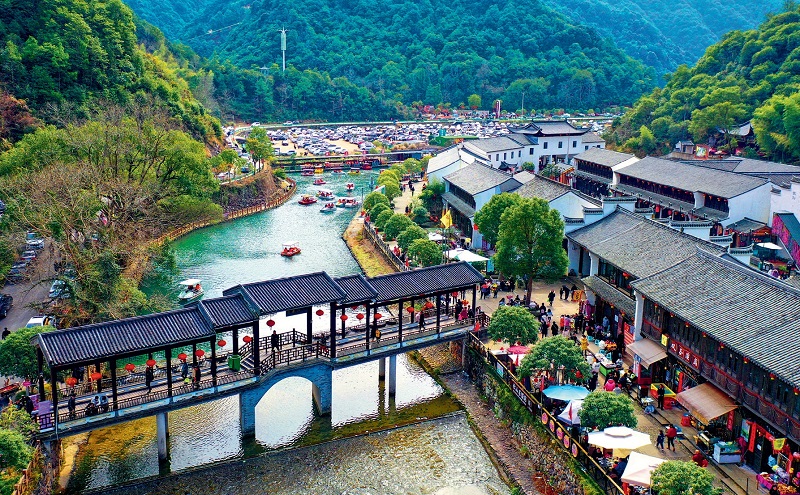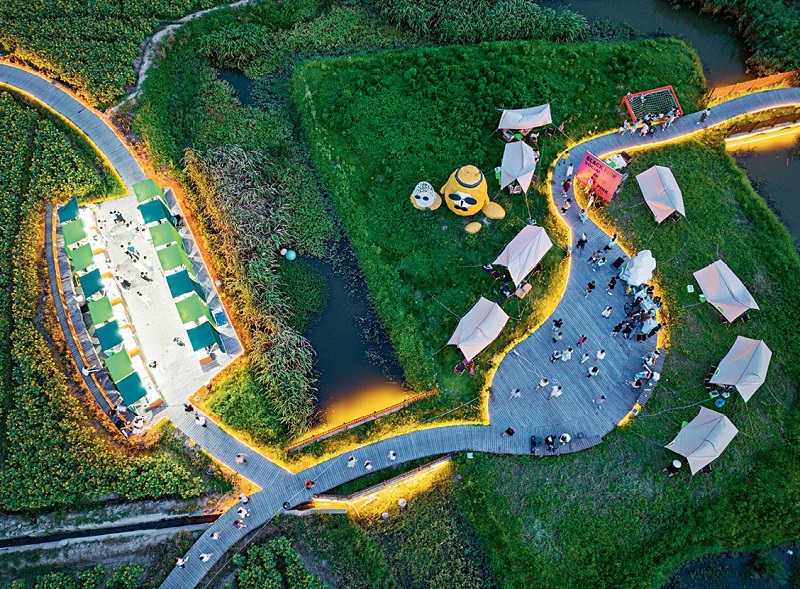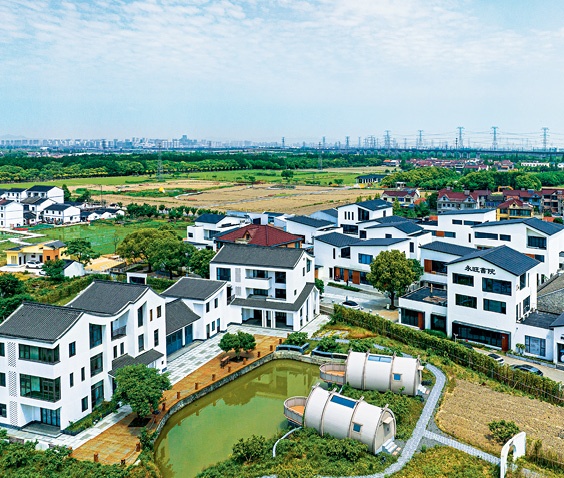This eastern province sets an example in rural revitalization through green development.
The Green Rural Revival Program is an innovative initiative launched by east China’s Zhejiang Pro-vince. It aims to promote comprehensive rural revitalization by focusing on environmental conservation and sustainable development.

Surrounded by mountains, the Yanxiapan Village in Sanmen County, Taizhou City, Zhejiang Province boasts an idyllic scenery interspersed with charming antique buildings.
Online Sensation
Surrounded by mountains, Yanxiapan Village in Taizhou City, Zhejiang Province, has an idyllic scenery interspersed with charming antique buildings.
“Three decades ago, we couldn’t have imagined the village would become so popular,” said Pan Liyi, the village leader. In the 1990s, hampered by inadequate transportation, the underdeveloped area saw many villagers leave to seek work elsewhere. At one time only 17 elderly residents remained in the village. Today, following a complete turn-around, Yanxiapan has become an online sensation thanks to the development of rural tourism.
“A 100-meter covered bridge spanning the Shuanglong Creek, connecting farmers’ residential area and the commercial street thronged by tourists, has become a landmark tourist attraction,” said Pan Xianxuan, one of the first returnees to invest in his hometown.
He invested in the construction of a water park and rafting project in 2013, which not only generated profit but also laid the foundation for the development of various tourist attractions and activities in the village.
Subsequently, the village has developed an array of tourist attractions as well as supporting businesses, including specialty food shops, bars and tea houses, agricultural produce shops, cafes, and high-end homestays, thus significantly boosting tourism income. During the peak tourism season, tour buses enter the village in an endless stream.
Seeing the boom, many young villagers working away from home came back to start their own business. Pan Neng, born in the 1990s and later worked in Hangzhou, was one of them. He returned to establish a homestay in Yanxiapan. “The projected annual income from operating the homestay is around RMB 300,000, and the small business has made rural life vibrant,” Pan said. She added that there is a steady flow of visitors even during the slack season. For example, for the coming weekend, over 20 tables at her homestay had been booked for diners.
The transformation has brought tangible benefits to the villagers and the village collective. “The village’s annual per capita income has increased from less than RMB 2,000 to RMB 100,000, and the collective’s income has risen from a deficit to over RMB 1 million, with comprehensive tourism revenue exceeding RMB 50 million,” said Pan Liyi.

Revitalizing and optimizing farmland in Yongwang Village raises the village’s popularity and attracts a large flow of visitors, making it a new favorite destination for rural tourism.
Cultural Enrichment
Xinjian Village in Zhoushan City has a uniquely styled rural art museum. The paintings it displays have been created by fishermen and are striking. Nearby is a painting experience area with paints, brushes, and canvases, ready to accommodate budding artists. Xinjian boasts numerous vistas for artists to paint and has developed a unique rural culture, creating a green development model that integrates ecology, culture, and tourism.
“Rural culture is the soul of our village’s development,” said Yu Jinhong, the village’s Party secretary.
Zhang Gaojun, head of the rural art museum, came to the village in 2012 at Yu’s invitation, and is responsible for creating and building the village’s cultural brand. “The first step was to establish a base for artistic exploration so as to attract undergraduates and increase popularity,” Zhang said. With a stable flow of visitors, Zhang focused his efforts on the integration of the paintings by fishermen and lacquer art. Villagers have benefited from his training, and their paintings and paper-cuts are sold online, thereby increasing their income.
Currently, the village has become a practice base for students from more than 20 art schools nationwide. Under the art promotion initiative, related industries such as homestays, dining, agricultural produce, and cultural and creative products in the village have made significant progress.
A slow train that used to transport Chinese scientists who participated in the development of missiles, nuclear bombs, and an artificial satellite, is displayed at the village square. Its carriages are used for demonstrations or talks to popularize science. Some have been converted into commercial spaces like shops, cafes, restaurants, and bars.
“We have also set up a bazaar at the train square, encouraging villagers to set up stalls to sell snacks, promoting entrepreneurship and increasing income,” said Yu.
“Today’s rural tourism not only enables people to appreciate natural pastoral scenery but also offers cultural experiences, which is a good thing for both tourists and villagers,” said a tourist, identified only by her surname Zhao.
Xinjian’s landscape includes vast expanses of flowers and the Nandong Art Valley, which became a national 4A-level scenic spot in 2021. Tourist arrivals in the village exceeded 400,000 in 2023, with tourism revenue reaching RMB 26 million. The village’s total income reached RMB 68 million in 2023, with the per capita income climbing to RMB 41,446.

Yongwang Village in southern China’s Ningbo City, Zhejiang Province, is activating idle resources to transform itself into a beautiful rural model for helping locals increase their income. Shen Zhipeng
Leveraging Local Resources
An eye-catching coffee shop stands by paddy fields in Yongwang Village, Ningbo City.
“This place was originally used for storing various goods. Then it was rented out and transformed into a café,” said Guo Chengjun, the village’s Party secretary. Initially, Guo was not very confident that a rural café could attract visitors, but it became popular within just two months.
The village has about 13 hectares of rice fields, seven hectares of flower fields, and 17 hectares of forest belts. While the cultivation of crops is ensured, large swathes of flowers make the area photogenic throughout the year.
Whether it is the café or the flower cultivation, the key lies in revitalizing and optimizing farmland, which helped the village to gain popularity and attract a large flow of visitors, quickly becoming a new favorite for rural leisure tourism.
According to Guo, to maintain popularity and bring more financial benefits, the village has intensified efforts to activate idle resources, striving to transform itself into a beautiful rural model for locals to increase income, new residents to live and work in peace, and the returnees to start businesses.
The Nijia Hamlet in Yongwang Village originally had 43 farmhouses clustered together, with nearly 70 percent of the farmhouses lying idle. Then the village introduced state-owned enterprises and social capital, adopting various methods such as whole leasing, relocation, and environmental upgrading. Forty of the farmhouses were transferred to other owners, and buildings of approximately 7,200 square meters were renovated, creating a startup hub of rural entrepreneurship.
The hub is divided into three main functional areas: the corporate office area which features courtyard-style independent spaces; the hall and surrounding areas which serve as supporting facilities, including shared office spaces such as co-working areas and reception salons, as well as leisure facilities like street-side cafes and cultural creative shops. The boutique homestay area offers business reception and accommodation services. Since the investment promotion in 2022, 49 enterprises and businesses have settled and begun operation, with an overall output value of approximately RMB 30 million in 2023.
A unique café with exquisite Polish porcelain is a highlight in the startup hub. According to the manager Wang Qiong, the most notable feature of Polish porcelain is its hand-painted designs and handcrafted shapes, with patterns often depicting natural scenery such as flowers, birds, or insects, which resonate with the idyllic style of Yongwang. Therefore, Wang established a “porcelain + coffee” business entity here for visitors to enjoy unique leisure environment by the countryside. “Yongwang, as a beautiful rural area model, presents us with greater opportunities,” said Wang.
The village is close to institutions such as the Ningbo University, the Ningbo Institute of Materials Technology and Engineering of the Chinese Academy of Sciences, and industrial parks like the Yongjiang Laboratory, creating a favorable atmosphere for innovation and entrepreneurship. To address the housing issue faced by young talents engaged in scientific research and entrepreneurship, the village has collaborated with state-owned enterprises to build 400 apartments.
In recent years, the village has successively been awarded accolades as a beautiful village with rural characteristics, a livable demonstration village, and a good governance demonstration village in Zhejiang. In 2022, it was also awarded as one of the first batch of provincial-level Future Villages. “Riding on the tide of building beautiful villages in the new era, relying on the location advantages, we will continue to activate and utilize idle resources so that village development reaches a new level,” Guo said.
The total tourism revenue in Zhejiang exceeded RMB 1 trillion in 2023, with the added value of the cultural and tourism industry reaching RMB 1.07 trillion, accounting for approximately 12.5 percent of the province’s GDP. This highlights its increasingly prominent position as a strategic pillar industry. From January to October 2024, the number of tourists and the total tourism revenue increased by 8.8 percent and 10 percent respectively, compared to the same period of the previous year. 
LI PINGSHU is a reporter with china.com.cn.